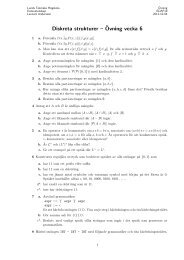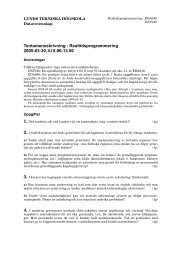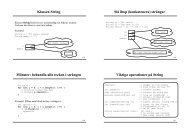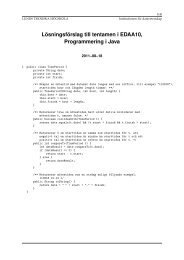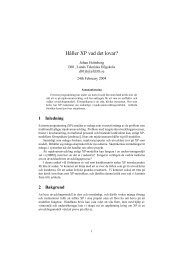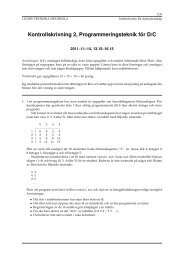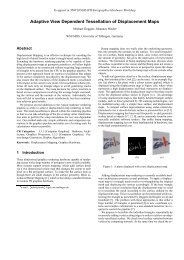Presentation
Presentation
Presentation
You also want an ePaper? Increase the reach of your titles
YUMPU automatically turns print PDFs into web optimized ePapers that Google loves.
Parallel Consistency in<br />
Constraint Programming<br />
Carl Christian Rolf &<br />
Krzysztof Kuchcinski<br />
Lund University<br />
ccr@cs.lth.se
Outline<br />
Introduction to Constraint Programming (CP)<br />
Parallelism in CP<br />
Our Model of Parallel Consistency<br />
Experimental Results<br />
Conclusions<br />
Future Work<br />
2
Introduction to CP<br />
Similar to Integer Programming, but more natural<br />
modeling<br />
Constraint programming is declarative, useful for<br />
automatic parallelism<br />
Can be used to formulate problems such as Sudoku,<br />
Jobshop scheduling, and aircrew scheduling<br />
Solving is NP-complete<br />
3
Solving a CP-Problem<br />
Constraint problem solving = Search + Consistency<br />
Search is usually depth-first<br />
Consistency prunes values that cannot lead to a<br />
solution (pruning not complete, hence search)<br />
Solving is search tree exploration with very heavy<br />
nodes<br />
4
Example of CP-Solving<br />
X ∈ {4}<br />
Y ∈ {0..9}<br />
X < Y<br />
X ∈ {4}<br />
Y ∈ {5..9}<br />
X < Y<br />
X = 4<br />
X ∈ {0..9}<br />
Y ∈ {0..9}<br />
X < Y<br />
X ≠ 4<br />
X ∈ {0..3, 5..9}<br />
Y ∈ {0..9}<br />
X < Y<br />
Consistency Consistency<br />
5<br />
X ∈ {0..3, 5..9}<br />
Y ∈ {1..9}<br />
X < Y<br />
One branch evaluated at a time<br />
Consistency enforced on every level of the search tree
Questions?<br />
Or are the basics of CP clear<br />
to everyone?
Parallelism in CP<br />
Data parallelism: Split the search tree<br />
Task parallelism: Split the work in the search nodes<br />
7
Problems with Data Parallelism<br />
Problems can’t always be split efficiently -<br />
eventually the work is too small<br />
Communication costs<br />
Does not suit all problems, e.g., scheduling need<br />
customized splitting method<br />
Consistency often magnitudes more time-<br />
consuming than search<br />
8
Solution<br />
Combine data and task parallelism<br />
When splitting is inefficient, use task parallelism<br />
When tasks are too small, split tree instead<br />
First we need task parallelism, hence this work<br />
9
Our Model of Parallel Consistency<br />
X ! {0..9}<br />
Y ! {0..9}<br />
The solver has several consistency threads (running<br />
on processors P1, P2, and P3 in the example)<br />
Each iteration of consistency takes data from the<br />
store held by the solver<br />
P1<br />
C1<br />
C1<br />
10<br />
P2 P3<br />
C2<br />
C2<br />
C3<br />
C3
Variants<br />
Shared updates: the changes to variables are visible<br />
to the other constraints before the barrier<br />
Thread local updates: the changes are only visible<br />
after the barrier<br />
Thread local updates needs no extra synchronization,<br />
but slower to detect inconsistency<br />
11
Shared Updates<br />
Constraint<br />
Queue<br />
Changes to variables are visible to other threads<br />
between constraints<br />
Thread 1 Thread 2 Thread 3<br />
Perform updates<br />
Add changed constraints to queue<br />
Done, waiting<br />
Done, waiting<br />
Barrier<br />
Updates are written to the store after the barrier<br />
12
Experimental Results<br />
n-Sudoku, n = 1024<br />
LA31, 30 by 10 jobshop<br />
n-Queens, n = 40 000<br />
JaCoP solver, written in Java 5<br />
Mac Pro with 8 cores<br />
Speed-up before search<br />
13
Consistent Store<br />
<br />
<br />
<br />
<br />
<br />
<br />
<br />
<br />
<br />
<br />
<br />
<br />
14
Observations<br />
Sudoku is a perfect problem, performs no pruning<br />
LA31 - global constraints are too small<br />
Queens - three alldiff constraints dominates<br />
execution<br />
15
Inconsistent Store<br />
<br />
<br />
<br />
<br />
<br />
<br />
<br />
<br />
<br />
<br />
16
Observations<br />
Many more iterations of consistency, also for<br />
Sudoku<br />
Speed-up drops compared to consistent store<br />
17
Active Threads<br />
8<br />
6<br />
4<br />
2<br />
0<br />
Processor Load<br />
Execution Progress<br />
Sudoku perfect, LA31 twelve<br />
iterations of consistency,<br />
Queens two iterations<br />
18<br />
Active Threads<br />
Active Threads<br />
8<br />
6<br />
4<br />
2<br />
0<br />
8<br />
6<br />
4<br />
2<br />
0<br />
Execution Progress<br />
Execution Progress
Conclusions<br />
Some problems do not scale well, they need<br />
parallel consistency algorithms<br />
Very hard to retain speed-up during search (due to<br />
locking and wait/notify)<br />
Small difference between thread local updates and<br />
shared updates<br />
Is probably best as an extension to data<br />
parallelism<br />
19
Future Work<br />
Combine data and task parallelism<br />
Load balancing in task parallelism<br />
Ideally: share updates during execution of<br />
consistency algorithms<br />
Long-term future of parallelism in CP: data parallelism<br />
+ task parallelism + parallel consistency algorithms<br />
20
Thank You<br />
Questions?






